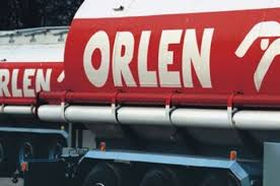Energy, Energy Market, EU – Baltic States, Legislation, Lithuania, Oil, Railways
International Internet Magazine. Baltic States news & analytics
Wednesday, 24.04.2024, 14:53
Poland delays projects crucial for Lithuania to press for discounts for Orlen
 Print version
Print version |
|---|
Lithuanian politicians tend to refuse commenting on the link in an effort to protect the relations, however, sources close to the government have told that Poland was blocking or putting off projects key to Lithuania to demand discounts for railway haulage of Orlen Lietuva's cargo.
Lithuania and Poland should shortly open talks on one of the most important energy projects of the decade, i.e., the synchronization of Baltic power networks with continental Europe. Furthermore, the countries have already launched the Gas Interconnector Poland-Lithuania (GIPL) gas pipeline estimated at over 500 mln euros. As it turned out earlier this month, the project has been delayed by 2.5 years in Poland, which caused major problems for Amber Grid, the Lithuanian gas transmission company, which will have to call off tenders that have already been started, furthermore, Poland may seek financial benefits, as the countries split the money again.
Analyst of Poland's Jagiellonian University, Wojciech Jakobik, noted that the Orlen-LG issue had reached the political level during the July visit of Polish government officials and Orlen CEOs in Vilnius.
"Warsaw sees Orlen interests in Lithuania as important as GIPL and LitPolLink2 projects. Orlen Lietuva assumes it is not treated equally and does not want to pay more than other Lithuanian Railways' customers. Discussion on this topic was transferred to political level during Polish delegation visit in Vilnius from July this year," told Jakobik, editor of the biznesalert.pl portal.
He also noted that Poland viewed the synchronization of power grids and a second electricity link with Lithuania from an entirely different angle – with the projects completed, stopping flow of cheap electricity from the Nordic flow will not be possible.
Lithuania's ex-minister of economy Kestutis Dauksys, a member of the parliamentary Energy Commission, also did not rule out that the pushing of GIPL could be a political decision made by Poland under the disguise of route revision.
"Energy and politics are closely related. If you need to find a reason, you will find one. If we recall the Druzhba oil pipeline, it 'malfunctioned' overnight. And it needed major repairs, therefore, it was closed down and nobody needs it now. This is exactly what can be happening here. There can also be technical aspects, as this is a big project," said Dauksys.
Meanwhile, Energy Minister Rokas Masiulis did not see a direct link between the Orlen talks with Lietuvos Gelezinkeliai (Lithuanian Railways, LG) and the synchronization negotiations between Lithuania and Poland.
"There is no direct connection, the issues are entirely separate, however, there is the general tone, as Orlen and oil issues are coordinated in the same ministry along with other issues, whereas in Lithuania they are separate," Masiulis said.
However, he has admitted that Poland's Energy Minister Krzysztof Tchorzewski had accentuated the Orlen issue at the last meeting in Krynica.
Lithuania's Transport and Communications Minister Rimantas Sinkevicius acknowledged he had heard hints from the Lithuanian Energy Ministry to speed up the negotiations between Lietuvos Gelezinkeliai and Orlen Lietuva, which, in his opinion, have an effect on energy projects.
"There have been hints," Sinkevicius told, adding that the disputes were about the size of discounts for Orlen Lietuva.
"The problem lies in the money – one side wants cheaper services, while the other wants a profit. The minimum split of opinions was 41 mln euros (last spring) until 2024. The maximum gap was fantastic at over 200 mln euros," said the minister.
Prime Minister Algirdas Butkevicius said that the government would not accept Orlen's demands if that might plunge the railway operator into losses, adding it would be a crime. Butkevicius has admitted earlier that a deal between LG and Orlen would make it simpler for Lithuania to speak with Poland about energy projects.
Sinkevicius also assured that Lietuvos Gelezinkeliai could not operate at a loss.
"There must be a legal justification behind any discount that comes in violation of an own company's economic interests and starting to operate at a loss. I cannot agree with the idea of loss-making operations for the sake of some other objectives. I cannot make this decision, as it would not make sense," Sinkevicius told.
Orlen Lietuva and LG disagree over a freight transportation contract that they signed back in 2009 and that is effective until in 2024.
Relations between the companies went sour in 2014 following the government's decision to change how infrastructure fees are calculated. As a result of this decision, fees for dangerous goods, including oil products, increased.
.








 «The Baltic Course» Is Sold and Stays in Business!
«The Baltic Course» Is Sold and Stays in Business!

